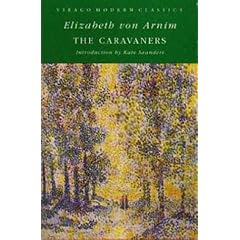
Elizabeth von Arnim’s The Caravaners, a gentle, charming satire, is, indeed, the kind of novel I would have read in 1909, when doubtless I would have been a housemaid pretending to dust the drawing room. The Caravaners is vaguely based on von Arnim’s own experiences as a caravaner, which she embarked on after seeing an advertisement for vans and horses (very like another adverisement, the impulse behind the trip to Italy in Enchanted April). “Pray for fine weather, my child,” she wrote to her daughter. “For if it wet heaven knows what will become of us.” According to Kate Saunders, who wrote the introduction of the 1988 Virago edition, “it was the wettest August on record, and the caravaners spent most of their time shivering over the cauldron of rain-splashed porridge.”
There is nothing worse than camping in the rain. Those of us who have done it know the misery. But Baron Otto von Ottringe, the narrow-minded narrator, does not put a good face on anything (and after all he has a caravan, not a tent). We see everything through the eyes of this smug, narrow-minded, anti-English Prussian, who has been persuaded to take a caravan trip in England with his young wife, Edelgarde (partially because it is cheap ). On the trip he hates every minute of it (just as he hates England): tramping beside the horse while it pulls the caravan (he had pictured sitting cosily inside), guiding it through narrrow gates (symbolic of his narrowness), rain all the time, begging food from farmers who won’t always sell to them, holding umbrellas over brew pots, sausages that never brown, washing up (which he shirks as women’s work).
His wife, Edelgarde, on the other hand, blooms. She shortens her dresses and refuses to wait on him. She points out that he can do everything he asks her to do. He cannot understand this rebellion. She relaxes as a result of her liberal companionship: the politically liberal German woman who suggested the trip, her Anglicized German sister, Mrs. Menzies-Legh, who has lived in England for many years, Jellaby, a socialist, and a lord, with whom Otto won’t even talk until he finds out he is “Lord Sigismund’” Otto alienates everyone. He only sees the caravaners as a microcism of his own society, in terms of rank, which he cannot spot in this classless society among the caravaners.
What a good book! Really a classic of its kinds. And it is set during August...
1 comment:
What a beautiful cover and how perfect. A time away, yes that's how they all should be.
Ellen
Post a Comment